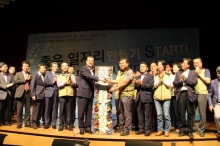Korean unions win Tripartite Cooperation

The process leading to this watershed moment commenced in May. On 24-28 April, KHMU, president Yoo Ji-hyun participated at the ILO Tripartite Meeting on Improving Employment and Working Conditions in the Health Services. Inspired by the conclusions of the meeting, KHMU committed to ensuring tripartism takes root as the critical scaffolding for social dialogue in Korea.
The process leading to the May 9 elections and the emergence of Mr Moon Jae-in as President of Korea also provided the structure of this political opportunity. KHMU had obtained commitments from all the contending parties before the elections that due attention would be given to improving the health sector and the welfare of health workers.
Shortly after the new government was sworn in, KHMU proposed a ‘Tripartite Cooperation’, to which the government replied: “We will actively support results of the negotiations between labor and management representatives.” The Healthcare Sector Employers’ Council, and the Korean Health and Medical Workers’ Union (KHMU, president Yoo Ji-hyun) held a first tripartite discussion with Mr. Lee Yong-sup, the Vice President of the National Job Creation Committee.
This would be the first official dialogue among the three parties—workers, management, and government—to discuss decent work creation in the health sector. KHMU proposed a “Grand Social Cooperation” of the social partners to address burning issues related to staffing levels, contract staffing and inhumane working hours. It also called on the employers to actively work with the union to establish centralized collective bargaining units, so that negotiations and bi-partite policy discussions could be held on a trans-enterprise basis.
Notably, the national health union further suggested that the National Job Creation Committee Chairperson and President of Korea, Mr. Moon Jae-in,[1] form a sub-group specific to the health and medical sector under the Committee. The Vice Chair, Mr. Lee agreed to this proposal and promised to create a platform for increasing jobs for healthcare workers. He said that he anticipated the tripartite cooperation in the health sector to be a success model for the rest of the society, expressing his commitment to actively support the process.
Mr. Yang Seung-jo, Chairperson of the Parliamentary Health and Welfare Committee, attended the tripartite dialogue on behalf of the members of the National Assembly. Mr. Lee Yong-sup, Vice Chair of the National Job Creation Committee, Mr. Gwon Duk-cheol, Vice Minister and Mr. Gang Do-tae, policy official on Health and Medical Sector at the Ministry of Health and Welfare, and Mr. Moon Gi-sup, senior manager of the Employment Policy Sector at the Ministry of Employment and Labor and other associates represented the government.
Altogether, a total of 300 persons including hospital management representatives, KHMU leadership, senior members of trade unions, experts, and journalists attended the meeting.
With the momentum generated by this groundbreaking tripartite meeting, KHMU began regular industry-wide negotiations with management representatives on 14 June. This pre-meeting for centralized bargaining set the context for a month-long win-win negotiations process, which culminated in the 12 July collective agreement.
In addition to the inspiring commitments made by both parties in the collective agreement, they agreed to submit the following requests to the government: setting up a plan to create additional 500,000 jobs in the healthcare sector; enacting a legislation on human resources for health; developing a fee-for-personnel system; improving the nurse staffing grade system; financially helping to meet the cost incurred from additional employment to fill up vacancies resulting from maternity/child care leave; eliminating the quota system to limit the number of personnel at public hospitals; and setting up of a tripartite Task Force team to address the multifarious issues related to shortages of human resources for health.
Finally, the two parties agreed to establish a sector-wide bipartite council by March 2018. This would lead to great improvements in labor-management relations at the industry level and the institutionalization of industry-based bargaining, as a driving force for sustained social dialogue.
[1] On May 10, the new administration announced job creation as its overriding priority and formed the National Job Creation Committee with President Moon Jae-in as its Chairperson. In response to this, the new President’s approval rating currently exceeds 84%.
This article is an extract from the “Right to Health” newsletter issue 03/2017. Subscribe to the newsletter. Send us your stories.

